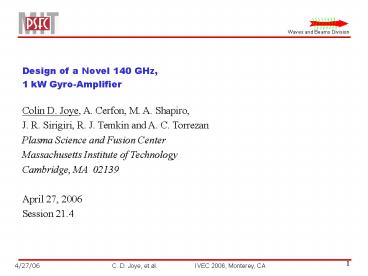Design of a Novel 140 GHz, - PowerPoint PPT Presentation
1 / 19
Title:
Design of a Novel 140 GHz,
Description:
Design of a Novel 140 GHz, 1 kW Gyro-Amplifier. Colin D. Joye, A. Cerfon, ... a novel confocal ... The design of a novel high-order mode gyro-TWT employing ... – PowerPoint PPT presentation
Number of Views:98
Avg rating:3.0/5.0
Title: Design of a Novel 140 GHz,
1
Design of a Novel 140 GHz, 1 kW
Gyro-Amplifier Colin D. Joye, A. Cerfon, M. A.
Shapiro, J. R. Sirigiri, R. J. Temkin and A. C.
Torrezan Plasma Science and Fusion
Center Massachusetts Institute of
Technology Cambridge, MA 02139 April 27,
2006 Session 21.4
2
Outline of Presentation
- Introduction, Specifications.
- Confocal waveguide.
- Simulations (linear, nonlinear, backward wave).
- Novel quasi-optical severs.
- Summary
3
Introduction
- Need for high gain, moderate power amplifiers at
gt100 GHz - Short pulse spectroscopy
- Electron Paramagnetic Resonance Nanosecond-scale
pulse sequences. - Dynamic Nuclear Polarization enhanced Nuclear
Magnetic Resonance. - Emerging medical applications.
- Explore a novel confocal structure
- Distributed diffractive loss to stabilize against
oscillations. - Avoids use of lossy ceramics or other custom
absorbers. - Based on a successful experiment at MIT1.
- Novel high order mode operation
1J. R. Sirigiri, M. A. Shapiro, R. J. Temkin,
High-power 140-GHz quasioptical gyrotron
traveling-wave amplifier, Phys Rev Lett, vol.
90, iss. 25, pp. 258302-4, 2003.
4
Amplifier Diagram
5
Input Transmission Line
- 12.6 mm (0.5 inch) diameter overmoded TE11
transmission line - 3.6 0.5 dB loss in 138-142 GHz band
6
Design Parameters
7
Superconducting Magnet
- 6.2T superconducting magnet from Magnex
Scientific. - Demonstrated to meet spec.
- 28cm flat field (/-0.5).
- 127mm warm bore diameter.
- 1m bore length.
- Shielded design reduces stray magnetic field
outside the magnet.
8
Varian VUW-8140 Triode
- Varian VUW-8140 Triode MIG
- V0 30 kV
- Cathode Radius 0.91 cm
- Magnetic compression 25
- Transverse spread lt 4
9
Confocal Waveguide
- Dispersion Relation
- Loss rates
- HFSS
10
Quasi-optical Confocal Structure
- Gaussian-like higher order mode
- Mode selectivity enhanced by diffraction
- Mode spectrum is sparser than a cylindrical
waveguide circuit - Suitable for harmonic operation
- Mechanical tuning capability in vacuum
- Surprisingly robust to misalignment
- Diffractive loss avoids custom lossy materials.
- Easily increase loss by cutting down the
aperture. - Simple sever implementations
Rc Mirror curvature and separation. a Aperture
size.
11
HFSS Model
- Simple input coupler design
- 5.5 GHz BW
- S11 lt -15 dB
12
Dispersion Relation
- HEMN Modes are spaced equidistant in frequency
and linearly in M and N, - The loss rates can be calculated
HE06 -1 dB/cm HE15 -28 dB/cm HE05 -2 dB/cm
Confocal waveguide can be highly selective.
HE05 is the primary BWO mode.
13
Theory vs. HFSS
- The simple Gaussian beam theory matches HFSS
within a few tenths of a dB/cm.
14
Simulations
- Linear
- Backward wave
- Nonlinear
15
Linear Gain Rate
Need 3 dB/cm to get gt50 dB total.
V0 30kV I0 2A a 0.75 v? spread 0 B0
4.94 T Mode HE06 Rc Lt 6.9mm Rb 1.85mm
Linear theory predicts significant gain as
required to meet spec.
16
Backward Wave Oscillations
- BWO criterion for the HE05 mode using general
start current equation1 - f 120.2 GHz
- V0 30 kV
- a 0.75
- B0 4.94 T
- Rc 6.9 mm
- Rb 1.85 mm (2nd max)
- For I02A, a3.0mm, we have 7.2 cm section
maximum lengths. - (code does not include kzI yet for confocal)
1Nusinovich and Li, Theory of gyro-travelling-wav
e tubes at cyclotron harmonics, Int. J. Elec.,
v. 72 (5-6), pp. 895-907, 1992.
17
Nonlinear Simulation
Sev
Gain profile at 140 GHz
- v? spread 6
- B0 4.97 T (99.7 grazing)
- Rc Lt 6.85mm
- a 3.0 mm
- Pin 10 mW
- Pout 2 kW pk gt 1 kW
- Sat. Gain 53 dB gt 50 dB
- BW(-3dB) 2.4 GHz gt 1GHz
18
Sever Options
- Confocal waveguide allows severs to be
constructed simply. - Diffractive sever region of very small aperture.
- HFSS 30 dB loss over 3cm.
- Quasi-optical sever due to the high bounce angle
of 75o, only a small gap is needed to achieve
high loss. - HFSS Undergoing simulation.
Waveguide top view
Waveguide side view
19
Summary
- The design of a novel high-order mode gyro-TWT
employing diffractive loss via confocal waveguide
has been presented. - A simple theory for confocal waveguide was
discussed. - Linear gain, backward wave thresholds were shown.
- Nonlinear simulations Requirements are within
reach. - Concepts for quasi-optical severs look very
promising. - Plan to run first experiment in August, 2006.
- This work is supported by NIH / NIBIB, grant
R01-EB001965.































